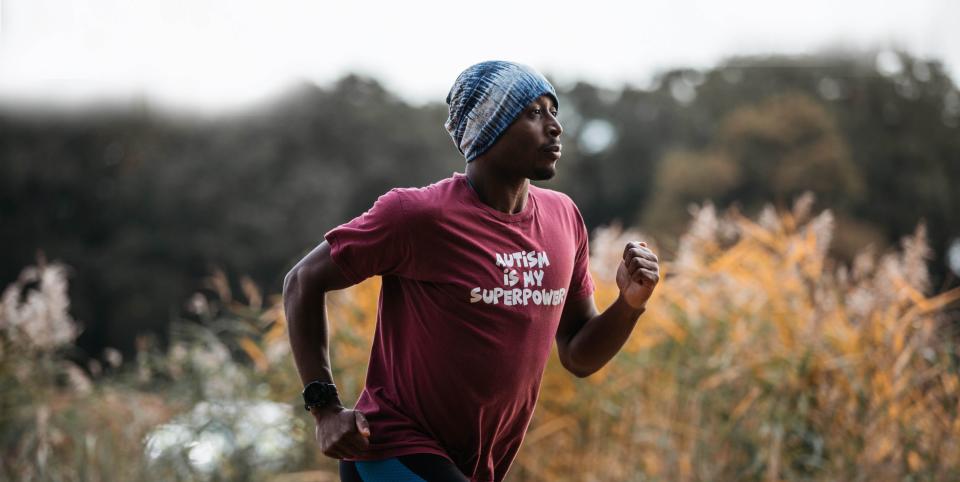Meet the man hoping to become the first professional triathlete with autism

Sam Holness says he has a significant advantage over many other up-and-coming athletes aiming for a career as a professional triathlete: he has autism.
'Autism is my superpower,' is printed on his T-shirt and looking at the achievements of the 27-year-old from west London, it's hard to argue. In January he was made a global ambassador for the shoe brand Hoka One One, and the company made a short film about him called Time to be Awesome. Last October, the charity Shaw Trust put him in its Power 100, a list of the most influential disabled people in the UK.
Having joined a running club at 18 and moved quickly from parkruns to 10Ks and half marathons, Holness completed his first duathlon in 2015, then his first half Ironman event, in Portugal, in 2019. (That's known as the 70.3 event, the total of its 1.2-mile swim, 56-mile bike ride and 13.1-mile run.) The big dream is to be the first athlete with autism to participate in the Ironman World Championships, and to turn professional.
His condition is a boon when it comes to training, he explains: 'I can focus for long periods while doing a repetitive task, and won't stop until it's completed. I will happily pound away on the treadmill, indoor rower or turbo trainer for hours on end. I hate not completing things that I start, and I never complain.'
But autism also made him a slow starter. He didn't begin speaking until he was four and acquiring the motor skills to do physical activities to a decent standard took time, too.
'My running technique was awful when I started because my coordination wasn't great,' he says. 'I had to learn to run properly. Getting a consistent stride length and getting my arms to work properly took months.'
A professional training regime
Now, Holness is quick; he has his eye on a sub-three-hour marathon and a sub-75-minute half within the next couple of years. He trains for between 20 and 24 hours a week, six days a week – 80 per cent aerobic, 20 per cent HIIT (high-intensity-interval training), with a little yoga in the evenings for strength, conditioning and to help with sleep, which can be an issue for people with autism.
His dad, Anthony, left his job in IT sales to coach and manage him; he is now a certified Ironman coach and is also pursuing British Triathlon Coaching qualifications. He's the best man for the job, says Holness.
'My dad knows how to communicate with me. I learn visibly and require my coach to speak slowly and not ask too many questions at once, because it can get confusing. We make a great team.'

Meanwhile, his mum looks after his nutrition and wellbeing. He also gets lessons and advice from Level 3 British Triathlon coach Matthew Tithecott, ultrarunner Andy Wren and Mick Woods, a performance coach at St Mary's University in Twickenham, London.
Holness also attended the university, completing a BSc in Sports Science, for which he wrote a dissertation on coaches who work with neurodiverse athletes.
'I found a need for coaches to communicate more effectively and use more visual tools, as well as having greater expectations,' he explains. 'Athletes with autism are ideal candidates for endurance sports, as they require focus and long efforts of aerobic training. I always do tasks to the best of my ability.'
Making triathlon more inclusive
Holness has high hopes of changing his sport in other ways, too. He's involved in an attempt to broaden triathlon inclusion for people with intellectual disabilities. Currently, he falls between two stools, unable to go to the Special Olympics because his IQ is greater than 75, but also prevented from participating in the Paralympics because he doesn't have a physical disability.
Of course, the main barrier lately has been the pandemic. 'I know that my dad is pleased with how I have coped, because I can get anxious when my routine changes too much,' he says.
Even so, the cancellation of every race he entered in 2020 has been hugely frustrating. 'I am fed up with Covid. I just want things to go back to normal so that I can race.'
At least his growing public profile can go on doing good work. Three thousand Instagram followers are keeping an eye on his training. If he can end up becoming the first pro triathlete with autism, he surely won't be the last.
'Being an athlete has changed my life by improving my confidence and self-esteem. It's given me purpose, goals and an opportunity to be the best I can,' he says.
'I have chosen to be an athlete so that I can motivate other people like me to take up sport and so that I can win medals. Don't let a disability be a reason for not doing sport.'
Like this article? Sign up to our newsletter to get more articles like this delivered straight to your inbox.
You Might Also Like

 Yahoo Sport
Yahoo Sport 





































